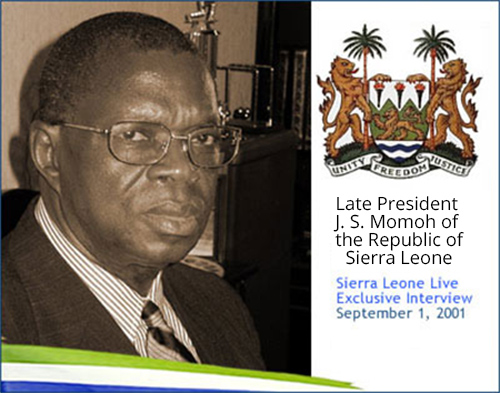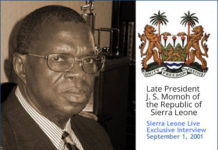President Joseph Saidu Momoh’s Interview by Sierra Leone Live
A brief History of President J. S. Momoh
(Taken from https://en.wikipedia.org/wiki/Joseph_Saidu_Momoh)
Joseph Saidu Momoh was born on January 26, 1937, in Binkolo, Bombali District in the Northern Province of Sierra Leone. He began his military career in 1958 with the Royal West African Frontier Force 9RWAFF) as a private. After further training in Ghana and the United Kingdom, he was commissioned as a second lieutenant in the Royal Sierra Leone Military Forces in 1963.
He was elevated to the rank of major and given command at Moa Barracks, Kailahun.
In 1969, Momoh became a lieutenant colonel and commanding officer of the First Battalion. A year later, he was promoted to the rank of Colonel.
He was appointed deputy force commander in 1971 by President Siaka Stevens, after a coup attempt by Brigadier John Bangura. Momoh succeeded Bangura as force commander in November 1971.
In 1974, he was appointed minister of state with cabinet status. He became a major-general in 1983.
In 1985, Momoh became secretary-general and head of the All People’s Congress (APC). The same year, he succeeded President Siaka Stevens by becoming the only candidate in a one-party election in the form of a referendum on 8 October 1985.
Momoh became the second President of Sierra Leone and he served from November 28, 1985, to April 29, 1992.
Momoh declared a state of economic emergency early in his rule, granting himself greater control over Sierra Leone’s economy, but he was not regarded as a dictator. Instead, his people viewed him as far too weak and inattentive to the affairs of the state, allowing his notoriously corrupt advisors to manipulate matters behind the scenes.
Momoh had inherited a disintegrating economy from his predecessor and he was unable to stop the trend. The country’s currency decreased in value. Sierra Leone reached the point under President Momoh where it could not afford to import gasoline and fuel oil, and the country went without electricity for months at a time
However, Momoh’s efforts at reform came too late to rescue Sierra Leone from chaos. He was overthrown in a military coup staged by Valentine Strasser, a 25-year-old army captain, in April 1992.
On 29 April 1992, the soldiers, led by Captain Valentine Strasser announced the military coup on the radio. Momoh fled to Guinea and sought political asylum. Momoh was granted political asylum in neighboring Guinea by President Lansana Conté. He took up residence in a mansion in Nongo Tadi, Conakry. Momoh died on August 2, 2003, at the age of 66.
Sierra Leone Live caught up with President Momoh on August of 2001, for an exclusive interview to document some of the problems he faced before and after his presidency. Here now is the Interview of President J. S. Momoh from Sierra Leone Live.
J. S. Momoh’s Interview – Part 1
First published, September 1, 2001 – Sierra Leone Live
SLL: You were Major General and Head of the Sierra Leone Army during the Siaka Stevens era. What did you bring to the army in terms of leadership or achievements that made Siaka Stevens to consider you for the presidency?
J.S. Momoh: First and foremost, I want to say loyalty. I served Siaka Stevens as Head of the Army for 14 years, from 1971 to 1985. During that period, there were lots of problems in Sierra Leone. About seven attempts were made to overthrow the government of Siaka Stevens. My loyal forces and I stood our ground. We thought that was not right. My own argument was that a government that is voted by the people should only be removed by the people. It does not matter how inefficient or corrupt people thought that government might be. The only way to remove an elected government should be through the ballot box. In that respect, I may be right to say I gave unflinching and unalloyed loyalty to Siaka Stevens, and for that matter to the people of Sierra Leone. I think that was one of the qualities he saw in me, and he decided that on his retirement I should be his successor.
I inherited an army that was built on a colonial pattern. I thought that was not good enough. As Head of the Army, I thought I should modernize it and make it more professional. In that respect I gave lots of opportunities to members of the armed forces, to travel to various parts of the world to engage in training, to attend courses and to upgrade themselves. So loyalty to Siaka Stevens and bringing leadership and professionalism to the army made him to consider me for the presidency.
SLL: What was the situation in the country socially, politically and economically at the time when Siaka Stevens handed over power to you?
J.S. Momoh: Economically the situation was bad. The world was in recession. That was not a situation that was peculiar to Sierra Leone. All the Third World economies were very bad. I inherited an economy that was bankrupt. There was virtually nothing in the kitty. I then decided to contact the IMF and the World Bank for a Structural Adjustment Program (SAP). We did that for three years, during which time Sierra Leone went through very difficult and trying times. Eventually, we were able to secure a program from the IMF and the World Bank.
Socially, where the economy is bad there are bound to be social repercussions. The situation in the country socially was not good. However, the good thing was that there was peace and stability in the country, except for early 1991, when Foday Sankoh and his rebels decided to attack the country.
Politically we had a one-party state since 1978. In 1990 I thought we should switch over to the multi-party system. I set up a committee to draw up the guidelines for a transition to multi-party democracy. On the 1st of October 1991, Sierra Leone became a multi-party state under my presidency.
SLL: Why did you decide to change to a multi-party system? Did you think the one-party system introduced by Siaka Stevens was not a good idea for the country?
J.S. Momoh: In the early 90s the whole world was then convinced that the one-party system was not a good form of government. The argument was that the one-party system does not offer enough opportunities to too many people. I held that belief too. To keep in line with the thinking of the world generally, I agreed that we should become a multi-party state, and fortunately, the whole country supported me on that issue.
SLL: Let us go back to your rise to the presidency in 1985. Most Sierra Leoneans believe that your appointment to the presidency by late Siaka Stevens was undemocratic because you were not chosen by the voters of Sierra Leone but by the leadership of the APC. Moreover, during the so-called presidential elections of 1985/86, you were in fact the sole presidential candidate and Sierra Leoneans had no opportunity to make a choice of leadership within the framework of the one-party system. Do you think this is a fair assessment of your rise to power, and in what ways did the feeling of lacking the popular mandate of the people affected your ability to govern the country?
J.S. Momoh: I think here I have to disagree with you. I was not appointed by Siaka Stevens. I was voted for by the people of Sierra Leone, and if you were in Sierra Leone you should have known that. First and foremost, I had to resign from the army to make myself eligible for the presidency. This was what the Constitution provided. Accordingly, I resigned from the army and became a civilian. It was not Siaka Stevens who handpicked me and said with effect from this day you are the president of Sierra Leone. That was not the case. I went through the twelve districts of Sierra Leone, including the Western Area, and canvassed the people. I went all over the country, every corner of Sierra Leone, and canvassed the people to vote for me. After that, I went through an election. I was voted for by all the people of Sierra Leone. I don’t think you are right to say that it was Siaka Stevens who appointed me as president. I was elected by the popular wishes of the people of Sierra Leone. I think we must get this point quite straight. I was voted for by the people of Sierra Leone, it was the popular decision of the people of Sierra Leone.
I agree that it was a one-party situation and in fact, there was only one candidate. But even with that, the people of Sierra Leone were given the opportunity to have a ‘no vote’ and a ‘yes vote’. If you were in Sierra Leone and you remember, 14% of the people who did not want me as president voted against me. It was not 100%. 86% said they wanted me as president and that was how I became president.
SLL: So you had no problems whether you had the popular mandate of the people or not at the time you took over the administration, and you were very much assured that you had the support of the whole country and that your policies were based on the mandate given by the people?
J.S. Momoh: Of course if you were in Sierra Leone you must have known that it was the popular wishes of the vast majority of the people of Sierra Leone to elect me as president. There were no problems at all.
Copyright 2001 – Sierra Leone Live


